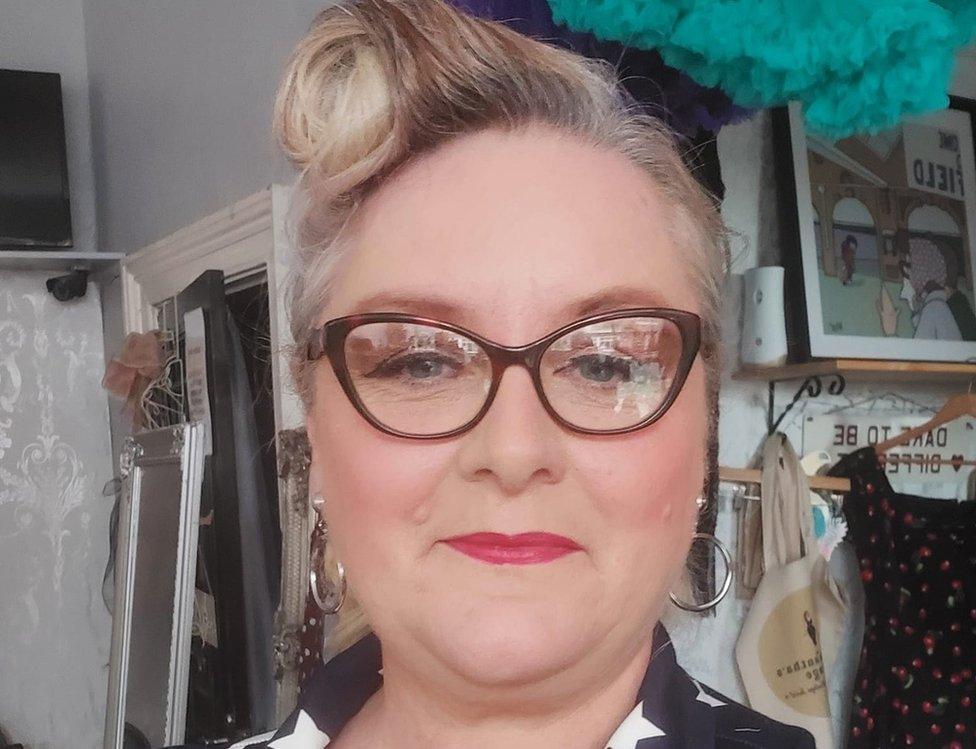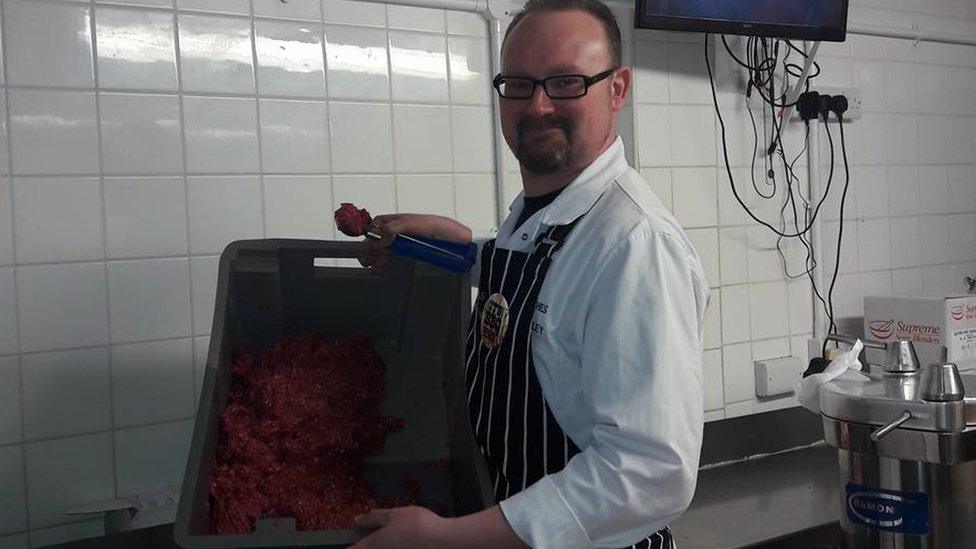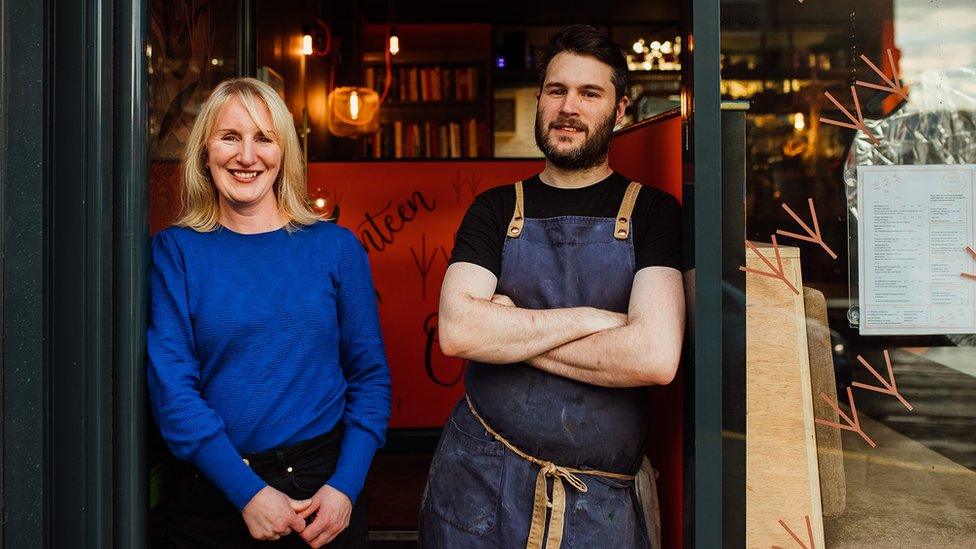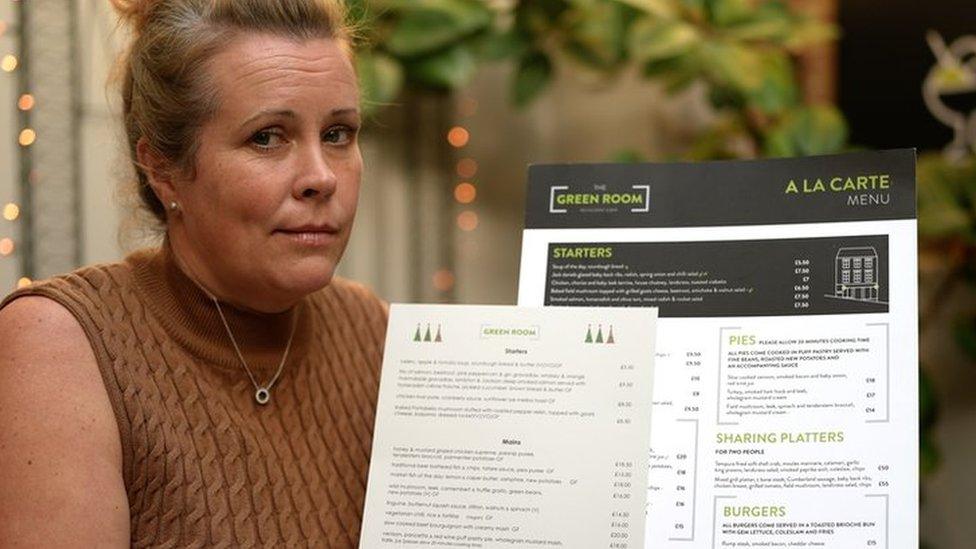Sheffield: High streets 'on cliff-edge' as cost of living crisis bites
- Published

Businesses in Sheffield are suffering from "a series of unprecedented shocks", the council says
High streets such as Sheffield's could soon be hit by a wave of closures due to the cost of living crisis and rising energy prices, an expert has warned.
A fifth of shops in parts of Sheffield were on the brink of shutting for good, retail analyst Simon Walton said.
Business closures in the city have gone up by 16% in 2022 and industry leaders have said the worst is still to come.
Mr Walton said: "We are walking along a cliff-edge which is liable to collapse at any moment."
He said he feared a "shakeout" in which hundreds of Sheffield's businesses went bust in the coming months.
'People don't have money'
Mr Walton, an independent consultant who works with businesses across Sheffield, said companies in all sectors were currently suffering.
"Their stock prices are going up, their running costs - particularly energy - are going up unsustainably.
"Their footfall is going down no matter what we try because people just don't have the money to spend."
Mr Walton said he knew of one neighbourhood in Sheffield where nearly 20% of shop owners were preparing to permanently close their premises within weeks.
"That's not an outlier. That's getting on for typical," he added.
Sheffield City Council said small firms were suffering "acutely" from "a series of unprecedented shocks".
Businesses already struggling from the impact of the Covid pandemic and Brexit were now having to deal with rising costs and depleted customer spending, it added.
Meanwhile, Kris Wigfield, managing partner at insolvency specialist Begbies Traynor's Sheffield office, said 35,000 companies across Yorkshire as a whole were in "significant distress".

Boutique owner Samantha Parsonage said the cost of living crisis was "affecting everybody".
Samantha Parsonage, who runs Miss Samantha's Vintage second-hand clothing boutique on South Road in Walkley, Sheffield, said she planned to close down her shop by the end of January.
"The current economic climate has driven this decision and I fear it's going to get worse before it gets better," she said.
Ms Parsonage said she planned to continue selling clothes online and at vintage fairs, but added that the cost of acquiring stock was rocketing while customers were tightening their belts.
"It's affecting everybody. People think, 'If I spend £50 on a cardigan, that's my weekly shop gone,'" she said.
'Worked so hard'
Chris Beech, who runs Beeches of Walkley, a butcher's shop, also on South Road, said he had lost vital catering orders from pubs and restaurants during the Covid pandemic.
His suppliers' prices were now going "up and up" as his customer numbers fell, he said.
Meanwhile, Mr Beech said his energy bill had doubled in 2022 and he also blamed the closure of roads as part of a council low-traffic scheme trial for reduced footfall on the street.
As a result, he said he had put his shop, which also contained a deli and Post Office, up for sale at below market rate and he planned to shut up shop if he did not find a buyer before his rent agreement ran out at the end of this year.
A coffee shop nearby had also closed down last month, he added.
"It's just getting harder and harder. We worked so hard to keep people in the area and attract trade.
"There are going to be a lot of holes on South Road," Mr Beech warned.

Chris Beech said it had been getting "harder and harder" to run his butcher's shop and he had decided to sell-up
A total of 1,970 businesses closed down in Sheffield during the first nine months of this year, up from 1,735 in the same period in 2021, according to the Office for National Statistics (ONS).
New openings had also fallen by 8%, according to the ONS.
Paula Goldthorpe, development manager for South Yorkshire at the Federation of Small Businesses, said she feared the worst was still to come.
"We are really struggling and I think we're yet to see the real pinch point," she said.
Ms Goldthorpe urged customers to support small independent firms, warning the impact of closures went beyond the economic toll of "empty shops and dying high streets".
"It has a trickle-down effect. You don't just lose a business, you lose support for those communities and employees as well," she said.
'Money is tight'
Two businesses in Sheffield which closed their doors last month were nightclub Code and the Dore Grill restaurant.
The owners of Code, in the city centre, cited a 500% increase in its electricity bills combined with falling student numbers.
The Dore Grill, a family-run restaurant, closed after 35 years, with its owners warning that high streets would be reduced to "Asda, Lidl, and Wetherspoons and very little else" if people did not support small independent businesses.
They said: "Times are hard for everyone. Money is tight and little family-run restaurants like ours cannot draw on the resources of a giant brewery or corporate machine."

Anne Horner and Matthew Duggan-Jones are now the only full-time staff at The Orange Bird in Sheffield
Sheffield City Council said food companies were being hit particularly hard by inflation and its business support staff were seeing closures "on an increasing scale".
Business owners were struggling to afford rent, energy bills and rising supply prices, it added.
The authority urged firms to make use of its free experts, saying they could help owners review their cashflow, find savings, and rethink their strategy.
Meanwhile, on 1 October, the government launched an energy relief scheme to subsidise businesses' costs, however that support is due to end in April.
'Still struggling'
Even businesses in Sheffield which have not seen increased energy costs or falling custom face an uncertain future.
The owners of the Orange Bird, a South African-inspired restaurant in Hillsborough, said they were lucky it was on a fixed-rate energy tariff until next October.
But owners Anne Horner and Matthew Duggan-Jones said while the restaurant was busier than ever, thanks in part to being named, external runner-up in this year's Observer Food Awards, they were still forced to cut their full-time staff from four to two in October to survive.
They said they were "still struggling" with the repayment of Covid loans, rising ingredient costs and a "crippling" VAT rate.
Restaurants could no longer rely on predictable patterns of trade, Ms Horner said.
"The uncertainty of the world seems to have been unending since March 2020," she said.

Follow BBC Yorkshire on Facebook, external, Twitter, external and Instagram, external. Send your story ideas to yorkslincs.news@bbc.co.uk, external.
Related topics
- Published24 November 2022

- Published22 November 2022
